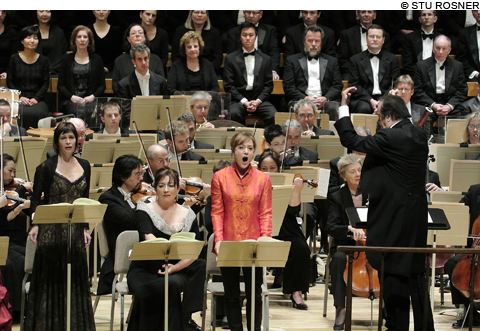
Sandrine Piau and Julie Boulianne, as the Child, perform in Ravel's L'Enfant et les sortileges with Charles Dutoit and the BSO |
Swiss conductor Charles Dutoit, a visitor to the Boston Symphony for more than three decades, was back for two of his three guest appearances this season (he'll return in January). His first program included two unusual works that Dutoit — with his Franco-Swiss background — was uniquely qualified to lead: Debussy's four Symphonic Fragments from The Martyrdom of St. Sebastian (incidental music for a "mystery play" by Gabriele d'Annunzio — an eerie mixture of the solemn and the sensual) and the Swiss composer Frank Martin's sensuous and unnerving Concerto for Seven Wind Instruments, timpani, percussion, and string orchestra (a friend called this "film noir music with a happy ending"). The BSO delivered gorgeous, insinuating performances.
But the reason Symphony Hall filled to capacity was surely the BSO debut of the Russian virtuoso Nikolai Lugansky, second-prize winner of the 1994 International Tchaikovsky Competition (no first prize that year — Van Cliburn was famously the first winner of this competition in 1958). Lugansky played the biggest and hardest of Rachmaninoff's four piano concertos, "Rach 3"— the "ultimate challenge," as program annotator Harlow Robinson called it, and the concerto that's at the center of the movie about the schizophrenic pianist David Helfgott, Shine.
Lugansky brought the crowd to its feet. He can certainly play all those notes. But what he didn't bring to this most rapturous of concertos was rapture. Not that he was unmusical — just that his playing was oddly, coldly disengaged; brilliant without feeling. The most enthralling live performance of the Rachmaninoff Third I've ever heard was the last time it was performed at the BSO, in March 2004, with Robert Spano leading pianist Garrick Ohlsson. I'll never forget the way Ohlsson seemed totally absorbed by what he was playing; that it all felt like a spontaneous outpouring; that he was using his virtuosity to convey what he was thinking and feeling. Lugansky was called back time and again, and at the end of this long evening, he played an encore — a glistening rendition of Rachmaninoff's Prelude in G-sharp minor that was the only moment of musical poetry he delivered all evening.
Dutoit returned the following week with a literally magical program — maybe the concert I was most looking forward to all season: Stravinsky's early one-act opera, The Nightingale (based on Hans Christian Andersen), its sumptuous Rimsky-Korsakovian first act begun just before the composer's three landmark ballets (Firebird, Petroushka, and The Rite of Spring) and the two more rhythmically and harmonically daring acts completed just after; and Ravel's exquisite L'enfant et les sortilèges (sometimes translated as "the spellbound child"), his poignant one-act "lyrical fantasy," the perfect setting of Colette's pitch-perfect libretto.
Pierre Boulez said he dedicated himself to music after first hearing The Nightingale. It's a piece that seems fundamentally about the healing power of music itself. Boulez has performed it frequently (I last heard him do it two years ago in Berlin, in a ravishing performance with the Berlin Philharmonic). In 1986, with the BSO, he played only Stravinsky's orchestral suite of music from the opera (the BSO has never programmed the complete opera before). Dutoit is not as refined a conductor, and though he couldn't always keep the volume down enough to allow all of the singing to be heard, and he occasionally milked tempos and let them drag, he still got gorgeous, detailed playing from the BSO.